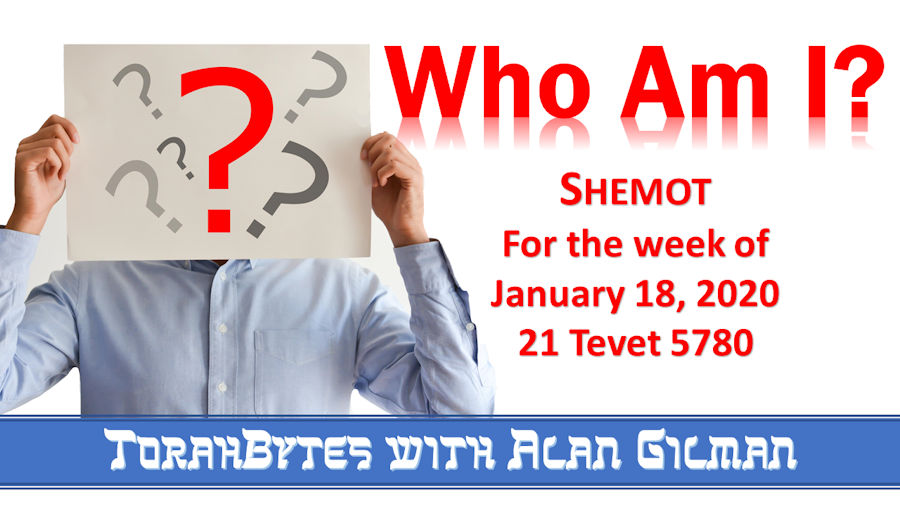For the week of January 18, 2020 / 21 Tevet 5780
 Shemot
Shemot
Torah: Shemot/Exodus 1:1 – 6:1
Haftarah: Isaiah 27:6 – 28:13; 29:22-23
Download Audio [Right click link to download]
“Come, I will send you to Pharaoh that you may bring my people, the children of Israel, out of Egypt.” But Moses said to God, “Who am I that I should go to Pharaoh and bring the children of Israel out of Egypt?” (Shemot/Exodus 3:10-11)
For many people, coming to grips with our identity is life’s greatest challenge. It doesn’t help that we live in what is perhaps the most meaningless time in history. If the world is made of nothing more than energy and matter plus chance, then we are the products of mindless randomization. Any semblance of meaning must therefore be a fantasy concocted by our imaginations. Without meaning, the concept of identity has no basis.
In spite of this, we long for a sense of purpose. We yearn to connect with others and with the world. But without being grounded in meaning, we remain confused. This confusion is one of the causes of relational difficulties and family breakdown. We dump our closest relationships because they don’t satisfy us. They don’t satisfy us because we don’t know why we are on this earth. The more fragmented our communities become, the more our identity crisis grows.
Moses had an identity crisis. God appears to him and gives him a mission, a mission that he sought to pursue forty years before. It didn’t go well back then. Now it was time. But not as far as Moses was concerned: he tries to get out of it. Note the first words out of his mouth as he responds to God’s directive: “Who am I that I should go to Pharaoh and bring the children of Israel out of Egypt?” (Shemot/Exodus 3:11). His issue was not with God – at least not on the surface – but with himself. Thinking he knew himself; this job was not for him.
Can you blame him? What a life he had up to this point! He lived in a day when the government sought to exterminate all the males of his people group. It’s nice that his parents tried to hang on to him as long as they could, but in the end, they put him in a basket in a river. Whether or not they hoped he’d be rescued is beside the point. But wasn’t he too young to be affected by this? Perhaps, yet he knew the story. But what choice did his parents have? Doesn’t matter, the people who were to protect him abandoned him. But wasn’t he miraculously saved by Pharaoh’s daughter? Moses’ mom even got paid to nurse him. Yes, both true, but adopted by the daughter of the evil emperor, who is out to destroy your entire people, while you retain a relationship with your birth mom who is functioning as a hireling? This would mess anyone up. The same with being raised among Egyptian royalty. Nice, but who wouldn’t feel guilty in palace luxury looking through their bedroom window at their people being abused as slaves?
There is every indication that Moses never forgot his Hebrew roots. He even sought to make a difference on their behalf but makes matters worse by killing an Egyptian in the process. Now Pharaoh, the head of his adopted family, wants him executed. So he becomes a fugitive, spending the next forty years among another foreign people, marrying one of them and raising a family in their midst.
No wonder Moses responds with “Who am I?” He is a nobody at best – an outcast and a criminal at worst. A person like this is chosen by the Master of the Universe to confront the planet’s superpower, demanding he release his vast workforce? In spite of God being God, he certainly has got the wrong guy – at least that’s what Moses thought.
And yet, in spite of Moses’ identity crisis and his attempt to resist God’s call, Moses gives in. We are not told what changed in his psyche to make him willing to confront Pharaoh. All we know is that he goes. Perhaps God’s responses to his objections were sufficient to bring about a change of heart and will. Or he surmised he didn’t have a choice in the matter. Something must have happened inside him, because not only does he accept the mission, he perseveres in it against overwhelming obstacles. Whatever changed his perspective, his life going forward proved God’s response to his “Who am I?” question to be true. For the most part, whatever the circumstances, Moses believed God when he said, “I will be with you” (Shemot/Exodus 3:12).
Once God clarified his relationship to Moses, he was able to emerge from being an outcast in the wilderness to a place of leadership among his people. Moses’ identity crisis, however, was not resolved simply by his hearing God’s clarification, but by believing God’s word to be true and living accordingly.
Scriptures taken from the English Standard Version